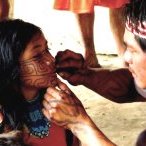English · Português

25 de junio de 2015 | Entrevistas | Financiarización de la naturaleza | Bosques y biodiversidad | Derechos humanos | Justicia climática y energía
The impacts of the financialization of nature in Brazilian indigenous communities and territories
Descargar: MP3 (1.7 MB)
The mechanisms of financialization of nature are promoted by transnational corporations, financial institutions and multilateral organizations as a way to defend nature and as a solution to the global climate crisis. Several of the mechanisms that operate under this logic are already being imposed in several countries. One of them is the so called “non-recoverable fund”, i.e. projects that do not aim at generating profit. The analyses and voices against them didn´t take long to appear and there are more and more arguments against them.
But it is becoming increasingly difficult to access the voices of communities where financialization of nature projects are taking place. For the purposes of adding to the testimonies of those affected by these projects, Real World Radio interviewed indigenous leader Ninawa Huni Kuin, of the Huni Kuin community, located in Acre, Brazil.
In 2010, this Amazonian state passed the SISA law (Environmental Services Incentive System), with the supposed goal of protecting the land, the “landscape beauty” of the area or reducing deforestation. But Ninawa told us that the projects promoted under this law are “prompting communities to participate in them without respecting their right to prior knowledge or consultation” about them. This is generating problems among the communities, such as “divisions between community leaders”.
The law establishes 7 types of public policy programs, but the only one implemented so far is the one related to the REDD mechanism (Reducing Emissions from Deforestation and Degradation). The divisions according to Ninawa seem to be caused by State actors in charge of implementing these types of projects: “some leaders in small communities are contacted and they start receiving money, so they begin to clash with the people who are against the projects” or against how they are being implemented.
The advance of projects
Ninawa provided an example of how financialization of nature projects are being imposed in his region: “The KfW (German development bank) is financing projects in Acre with “non-recoverable funds”. These resources are already being used in some indigenous communities without them knowing for what, or from where these resources come from”.
The communities that decide to reject participating in these projects are harassed and pressured, according to the indigenous leader: “they have had their social benefits withdrawn, the leaders have been discredited saying that they do not represent communities or that we are against them, and I have been threatened for the denunciations I filed at international spaces”.
Even key organizations that support indigenous people in the region, such as the Missionary Indigenous Council (CIMI) have suffered attacks for supporting the position of communities that do not accept to be included in this type of projects.
The strategy of imposition varies, according to the leader. The Yawanawa indigenous people has denounced that the company VEDA has proposed finance through what they call a Plan of Life for the Yawanawa People, demanding transparency: “They have called it a Plan of Life, but we know it is a REDD project; they have changed the name to deceive communities”.
Ninawa regrets that those who have been able to access information about this type of projects and therefore oppose them, cannot travel to all communities which are being offered participation in REDD projects, due to a lack of economic resources.
Imagen: Alice Haibara








